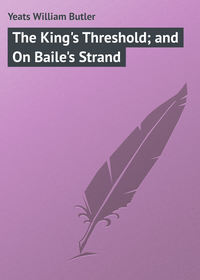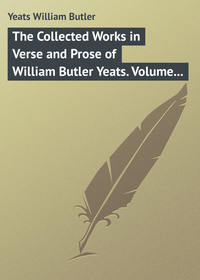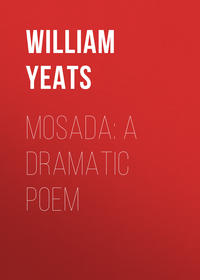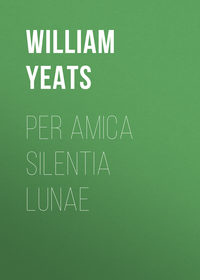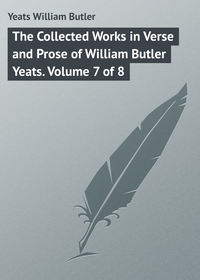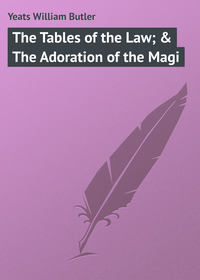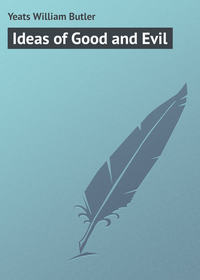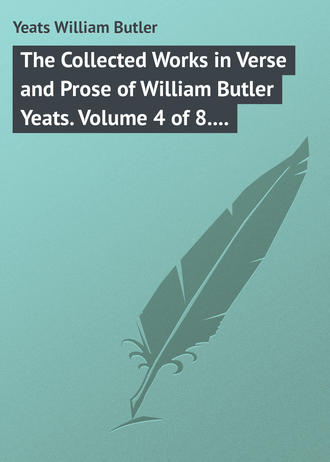 полная версия
полная версияThe Collected Works in Verse and Prose of William Butler Yeats. Volume 4 of 8. The Hour-glass. Cathleen ni Houlihan. The Golden Helmet. The Irish Dramatic Movement
It is perhaps nearly impossible to make recitation a living thing, for there is no existing taste one can appeal to; but it should not be hard here in Ireland to interest people in songs that are made for the word’s sake and not for the music, or for that only in a secondary degree. They are interested in such songs already, only the songs have little subtilty of thought and of language. One does not find in them that modern emotion which seems new because it has been brought so very lately out of the cellar. At their best they are the songs of children and of country people, eternally young for all their centuries, and yet not even in old days, as one thinks, the art of kings’ houses. We require a method of setting to music that will make it possible to sing or to speak to notes a poem like Rossetti’s translation of The Ballad of Dead Ladies in such a fashion that no word shall have an intonation or accentuation it could not have in passionate speech. It must be set for the speaking-voice, like the songs that sailors make up or remember, and a man at the far end of the room must be able to take it down on a first hearing. An English musical paper said the other day, in commenting on something I had written, ‘Owing to musical necessities, vowels must be lengthened in singing to an extent which in speech would be ludicrous if not absolutely impossible.’ I have but one art, that of speech, and my feeling for music dissociated from speech is very slight, and listening as I do to the words with the better part of my attention, there is no modern song sung in the modern way that is not to my taste ‘ludicrous’ and ‘impossible.’ I hear with older ears than the musician, and the songs of country people and of sailors delight me. I wonder why the musician is not content to set to music some arrangement of meaningless liquid vowels, and thereby to make his song like that of the birds; but I do not judge his art for any purpose but my own.11 It is worthless for my purpose certainly, and it is one of the causes that are bringing about in modern countries a degradation of language. I have to find men with more music than I have, who will develop to a finer subtilty the singing of the cottage and the forecastle, and develop it more on the side of speech than that of music, until it has become intellectual and nervous enough to be the vehicle of a Shelley or a Keats. For some purposes it will be necessary to divine the lineaments of a still older art, and re-create the regulated declamations that died out when music fell into its earliest elaborations. Miss Farr has divined enough of this older art, of which no fragment has come down to us – for even the music of Aucassin and Nicolette, with its definite tune, its recurring pattern of sound, is something more than declamation – to make the chorus of Hippolytus and of the Trojan Women, at the Court Theatre or the Lyric, intelligible speech, even when several voices spoke together. She used very often definite melodies of a very simple kind, but always when the thought became intricate and the measure grave and slow, fell back upon declamation regulated by notes. Her experiments have included almost every kind of verse, and every possible elaboration of sound compatible with the supremacy of the words. I do not think Homer is ever so moving as when she recites him to a little tune played on a stringed instrument not very unlike a lyre. She began at my suggestion with songs in plays, for it was clearly an absurd thing that words necessary to one’s understanding of the action, either because they explained some character, or because they carried some emotion to its highest intensity, should be less intelligible than the bustling and ruder words of the dialogue. We have tried our art, since we first tried it in a theatre, upon many kinds of audiences, and have found that ordinary men and women take pleasure in it and sometimes tell one that they never understood poetry before. It is, however, more difficult to move those, fortunately for our purpose but a few, whose ears are accustomed to the abstract emotion and elaboration of notes in modern music.
VI
If we accomplish this great work, if we make it possible again for the poet to express himself, not merely through words, but through the voices of singers, of minstrels, of players, we shall certainly have changed the substance and the manner of our poetry. Everyone who has to interest his audience through the voice discovers that his success depends upon the clear, simple and varied structure of his thought. I have written a good many plays in verse and prose, and almost all those plays I have rewritten after performance, sometimes again and again, and every change that has succeeded has been an addition to the masculine element, an increase of strength in the bony structure.
Modern literature, above all poetical literature, is monotonous in its structure and effeminate in its continual insistence upon certain moments of strained lyricism. William Morris, who did more than any modern to recover mediæval art, did not in his Earthly Paradise copy from Chaucer, from whom he copied so much that was naïve and beautiful, what seems to me essential in Chaucer’s art. He thought of himself as writing for the reader, who could return to him again and again when the chosen mood had come, and became monotonous, melancholy, too continuously lyrical in his understanding of emotion and of life. Had he accustomed himself to read out his poems upon those Sunday evenings that he gave to Socialist speeches, and to gather an audience of average men, precisely such an audience as I have often seen in his house, he would have been forced to Chaucer’s variety, to his delight in the height and depth, and would have found expression for that humorous many-sided nature of his. I owe to him many truths, but I would add to those truths the certainty that all the old writers, the masculine writers of the world, wrote to be spoken or to be sung, and in a later age to be read aloud, for hearers who had to understand swiftly or not at all, and who gave up nothing of life to listen, but sat, the day’s work over, friend by friend, lover by lover.
THE ARROW: 1906.12
THE SEASON’S WORK
A character of the winter’s work will be the large number of romantic, poetic and historical plays – that is to say, of plays which require a convention for their performance; their speech, whether it be verse or prose, being so heightened as to transcend that of any form of real life. Our first two years of The Abbey Theatre have been expended mostly on the perfecting of the Company in peasant comedy and tragedy. Every national dramatic movement or theatre in countries like Bohemia and Hungary, as in Elizabethan England, has arisen out of a study of the common people, who preserve national characteristics more than any other class, and out of an imaginative recreation of national history or legend. The life of the drawing-room, the life represented in most plays of the ordinary theatre of to-day, differs but little all over the world, and has as little to do with the national spirit as the architecture of, let us say, St. Stephen’s Green, or Queen’s Gate, or of the Boulevards about the Arc de Triomphe.
As we wish our work to be full of the life of this country, our stage-manager has almost always to train our actors from the beginning, always so in the case of peasant plays, and this makes the building up of a theatre like ours the work of years. We are now fairly satisfied with the representation of peasant life, and we can afford to give the greater part of our attention to other expressions of our art and of our life. The romantic work and poetical work once reasonably good, we can, if but the dramatist arrive, take up the life of our drawing-rooms, and see if there is something characteristic there, something which our nationality may enable us to express better than others, and so create plays of that life and means to play them as truthful as a play of Hauptmann’s or of Ibsen’s upon the German or Scandinavian stage. I am not myself interested in this kind of work, and do not believe it to be as important as contemporary critics think it is, but a theatre such as we project should give a reasonably complete expression to the imaginative interests of its country. In any case it was easier, and therefore wiser, to begin where our art is most unlike that of others, with the representation of country life.
It is possible to speak the universal truths of human nature whether the speakers be peasants or wealthy men, for —
‘Love doth singAs sweetly in a beggar as a king.’So far as we have any model before us it is the national and municipal theatre in various Continental towns, and, like the best of these, we must have in our repertory masterpieces from every great school of dramatic literature, and play them confidently, even though the public be slow to like that old stern art, and perhaps a little proudly, remembering that no other English-speaking theatre can be so catholic. Certainly the weathercocks of our imagination will not turn those painted eyes of theirs too long to the quarter of the Scandinavian winds. If the wind blow long from the Mediterranean, the paint may peel before we pray for a change in the weather.
THE CONTROVERSY OVER THE PLAYBOY OF THE WESTERN WORLD
We have claimed for our writers the freedom to find in their own land every expression of good and evil necessary to their art, for Irish life contains, like all vigorous life, the seeds of all good and evil, and a writer must be free here as elsewhere to watch where weed or flower ripen. No one who knows the work of our Theatre as a whole can say we have neglected the flower; but the moment a writer is forbidden to take pleasure in the weed, his art loses energy and abundance. In the great days of English dramatic art the greatest English writer of comedy was free to create The Alchemist and Volpone, but a demand born of Puritan conviction and shop-keeping timidity and insincerity, for what many second-rate intellects thought to be noble and elevating events and characters, had already at the outset of the eighteenth century ended the English drama as a complete and serious art. Sheridan and Goldsmith, when they restored comedy after an epoch of sentimentalities, had to apologise for their satiric genius by scenes of conventional love-making and sentimental domesticity that have set them outside the company of all, whether their genius be great or little, whose work is pure and whole. The quarrel of our Theatre to-day is the quarrel of the Theatre in many lands; for the old Puritanism, the old dislike of power and reality have not changed, even when they are called by some Gaelic name.
[On the second performance of The Playboy of the Western World about forty men who sat in the middle of the pit succeeded in making the play entirely inaudible. Some of them brought tin-trumpets, and the noise began immediately on the rise of the curtain. For days articles in the Press called for the withdrawal of the play, but we played for the seven nights we had announced; and before the week’s end opinion had turned in our favour. There were, however, nightly disturbances and a good deal of rioting in the surrounding streets. On the last night of the play there were, I believe, five hundred police keeping order in the theatre and in its neighbourhood. Some days later our enemies, though beaten so far as the play was concerned, crowded into the cheaper seats for a debate on the freedom of the stage. They were very excited, and kept up the discussion until near twelve. The last paragraphs of my opening statement ran as follows.]
From Mr. Yeats’ opening Speech in the Debate on February 4, 1907, at the Abbey Theatre.The struggle of the last week has been long a necessity; various paragraphs in newspapers describing Irish attacks on Theatres had made many worthy young men come to think that the silencing of a stage at their own pleasure, even if hundreds desired that it should not be silenced, might win them a little fame, and, perhaps, serve their country. Some of these attacks have been made on plays which are in themselves indefensible, vulgar and old-fashioned farces and comedies. But the attack, being an annihilation of civil rights, was never anything but an increase of Irish disorder. The last I heard of was in Liverpool, and there a stage was rushed, and a priest, who had set a play upon it, withdrew his play and apologised to the audience. We have not such pliant bones, and did not learn in the houses that bred us a so suppliant knee. But behind the excitement of example there is a more fundamental movement of opinion. Some seven or eight years ago the National movement was democratised and passed from the hands of a few leaders into those of large numbers of young men organised in clubs and societies. These young men made the mistake of the newly-enfranchised everywhere; they fought for causes worthy in themselves with the unworthy instruments of tyranny and violence. Comic songs of a certain kind were to be driven from the stage, everyone was to wear Irish cloth, everyone was to learn Irish, everyone was to hold certain opinions, and these ends were sought by personal attacks, by virulent caricature and violent derision. It needs eloquence to persuade and knowledge to expound; but the coarser means come ready to every man’s hand, as ready as a stone or a stick, and where these coarse means are all, there is nothing but mob, and the commonest idea most prospers and is most sought for.
Gentlemen of the little clubs and societies, do not mistake the meaning of our victory; it means something for us, but more for you. When the curtain of The Playboy fell on Saturday night in the midst of what The Sunday Independent– no friendly witness – described as ‘thunders of applause,’ I am confident that I saw the rise in this country of a new thought, a new opinion, that we had long needed. It was not all approval of Mr. Synge’s play that sent the receipts of the Abbey Theatre this last week to twice the height they had ever touched before. The generation of young men and girls who are now leaving schools or colleges are weary of the tyranny of clubs and leagues. They wish again for individual sincerity, the eternal quest of truth, all that has been given up for so long that all might crouch upon the one roost and quack or cry in the one flock. We are beginning once again to ask what a man is, and to be content to wait a little before we go on to that further question: What is a good Irishman? There are some who have not yet their degrees that will say to friend or neighbour, ‘You have voted with the English, and that is bad’; or ‘You have sent away your Irish servants, or thrown away your Irish clothes, or blacked your face for your singing. I despise what you have done, I keep you still my friend; but if you are terrorised out of doing any of these things, evil things though I know them to be, I will not have you for my friend any more.’ Manhood is all, and the root of manhood is courage and courtesy.
1907
ON TAKING THE PLAYBOY TO LONDON
The failure of the audience to understand this powerful and strange work (The Playboy of the Western World) has been the one serious failure of our movement, and it could not have happened but that the greater number of those who came to shout down the play were no regular part of our audience at all, but members of parties and societies whose main interests are political. We have been denounced with even greater violence than on the first production of the play for announcing that we should carry it to London. We cannot see that an attack, which we believe to have been founded on a misunderstanding of the nature of literature, should prevent us from selecting, as our custom is, whatever of our best comes within the compass of our players at the time, to show in some English theatres. Nearly all strong and strange writing is attacked on its appearance, and those who press it upon the world may not cease from pressing it, for their justification is its ultimate acceptance. Ireland is passing through a crisis in the life of the mind greater than any she has known since the rise of the Young Ireland party, and based upon a principle which sets many in opposition to the habits of thought and feeling come down from that party, for the seasons change, and need and occupation with them. Many are beginning to recognise the right of the individual mind to see the world in its own way, to cherish the thoughts which separate men from one another, and that are the creators of distinguished life, instead of those thoughts that had made one man like another if they could, and have but succeeded in setting hysteria and insincerity in place of confidence and self-possession. To the Young Ireland writers, who have the ear of Ireland, though not its distracted mind, truth was historical and external and not a self-consistent personal vision, and it is but according to ancient custom that the new truth should force its way amid riot and great anger.
APPENDIX I
THE HOUR-GLASS
This play is founded upon the following story, recorded by Lady Wilde in Ancient Legends of Ireland, 1887, vol. i., pp. 60-67: —
THE PRIEST’S SOUL
In former days there were great schools in Ireland where every sort of learning was taught to the people, and even the poorest had more knowledge at that time than many a gentleman has now. But as to the priests, their learning was above all, so that the fame of Ireland went over the whole world, and many kings from foreign lands used to send their sons all the way to Ireland to be brought up in the Irish schools.
Now, at this time there was a little boy learning at one of them who was a wonder to every one for his cleverness. His parents were only labouring people, and of course very poor; but young as he was, and poor as he was, no king’s or lord’s son could come up to him in learning. Even the masters were put to shame; for when they were trying to teach him he would tell them something they had never heard of before, and show them their ignorance. One of his great triumphs was in argument, and he would go on till he proved to you that black was white, and then when you gave in, for no one could beat him in talk, he would turn round and show you that white was black, or may be that there was no colour at all in the world. When he grew up his poor father and mother were so proud of him that they resolved to make him a priest, which they did at last, though they nearly starved themselves to get the money. Well, such another learned man was not in Ireland, and he was as great in argument as ever, so that no one could stand before him. Even the Bishops tried to talk to him, but he showed them at once they knew nothing at all.
Now, there were no schoolmasters in those times, but it was the priests taught the people; and as this man was the cleverest in Ireland all the foreign kings sent their sons to him as long as he had house-room to give them. So he grew very proud, and began to forget how low he had been, and, worst of all, even to forget God, who had made him what he was. And the pride of arguing got hold of him, so that from one thing to another he went on to prove that there was no Purgatory, and then no Hell, and then no Heaven, and then no God; and at last that men had no souls, but were no more than a dog or a cow, and when they died there was an end of them. ‘Who ever saw a soul?’ he would say. ‘If you can show me one, I will believe.’ No one could make any answer to this; and at last they all came to believe that as there was no other world, every one might do what they liked in this, the priest setting the example, for he took a beautiful young girl to wife. But as no priest or bishop in the whole land could be got to marry them, he was obliged to read the service over for himself. It was a great scandal, yet no one dared to say a word, for all the kings’ sons were on his side, and would have slaughtered any one who tried to prevent his wicked goings-on. Poor boys! they all believed in him, and thought every word he said was the truth. In this way his notions began to spread about, and the whole world was going to the bad, when one night an angel came down from Heaven, and told the priest he had but twenty-four hours to live. He began to tremble, and asked for a little more time.
But the angel was stiff, and told him that could not be.
‘What do you want time for, you sinner?’ he asked.
‘Oh, sir, have pity on my poor soul!’ urged the priest.
‘Oh, ho! You have a soul, then?’ said the angel. ‘Pray how did you find that out?’
‘It has been fluttering in me ever since you appeared,’ answered the priest. ‘What a fool I was not to think of it before!’
‘A fool, indeed,’ said the angel. ‘What good was all your learning, when it could not tell you that you had a soul?’
‘Ah, my lord,’ said the priest, ‘if I am to die, tell me how soon I may be in heaven.’
‘Never,’ replied the angel. ‘You denied there was a Heaven.’
‘Then, my lord, may I go to Purgatory?’
‘You denied Purgatory also; you must go straight to Hell,’ said the angel.
‘But, my lord, I denied Hell also,’ answered the priest, ‘so you can’t send me there either.’
The angel was a little puzzled.
‘Well,’ said he, ‘I’ll tell you what I can do for you. You may either live now on earth for a hundred years enjoying every pleasure, and then be cast into Hell for ever; or you may die in twenty-four hours in the most horrible torments, and pass through Purgatory, there to remain till the Day of Judgment, if only you can find some one person that believes, and through his belief mercy will be vouchsafed to you and your soul will be saved.’
The priest did not take five minutes to make up his mind.
‘I will have death in the twenty-four hours,’ he said, ‘so that my soul may be saved at last.’
On this the angel gave him directions as to what he was to do, and left him.
Then, immediately, the priest entered the large room where all his scholars and the kings’ sons were seated, and called out to them —
‘Now, tell me the truth, and let none fear to contradict me. Tell me what is your belief. Have men souls?’
‘Master,’ they answered, ‘once we believed that men had souls; but, thanks to your teaching, we believe so no longer. There is no Hell, and no Heaven, and no God. This is our belief, for it is thus you taught us.’
Then the priest grew pale with fear, and cried out: ‘Listen! I taught you a lie. There is a God, and man has an immortal soul. I believe now all I denied before.’
But the shouts of laughter that rose up drowned the priest’s voice, for they thought he was only trying them for argument.
‘Prove it, master,’ they cried, ‘prove it! Who has ever seen God? Who has ever seen the soul?’
And the room was stirred with their laughter.
The priest stood up to answer them, but no word could he utter; all his eloquence, all his powers of argument, had gone from him, and he could do nothing but wring his hands and cry out —
‘There is a God! there is a God! Lord, have mercy on my soul!’
And they all began to mock him, and repeat his own words that he had taught them —
‘Show him to us; show us your God.’
And he fled from them groaning with agony, for he saw that none believed, and how then could his soul be saved?
But he thought next of his wife.
‘She will believe,’ he said to himself. ‘Women never give up God.’
And he went to her; but she told him that she believed only what he taught her, and that a good wife should believe in her husband first, and before and above all things in heaven or earth.
Then despair came on him, and he rushed from the house and began to ask every one he met if they believed. But the same answer came from one and all: ‘We believe only what you have taught us,’ for his doctrines had spread far and wide through the county.
Then he grew half mad with fear, for the hours were passing. And he flung himself down on the ground in a lonesome spot, and wept and groaned in terror, for the time was coming fast when he must die.
Just then a little child came by.
‘God save you kindly,’ said the child to him.
The priest started up.
‘Child, do you believe in God?’ he asked.




